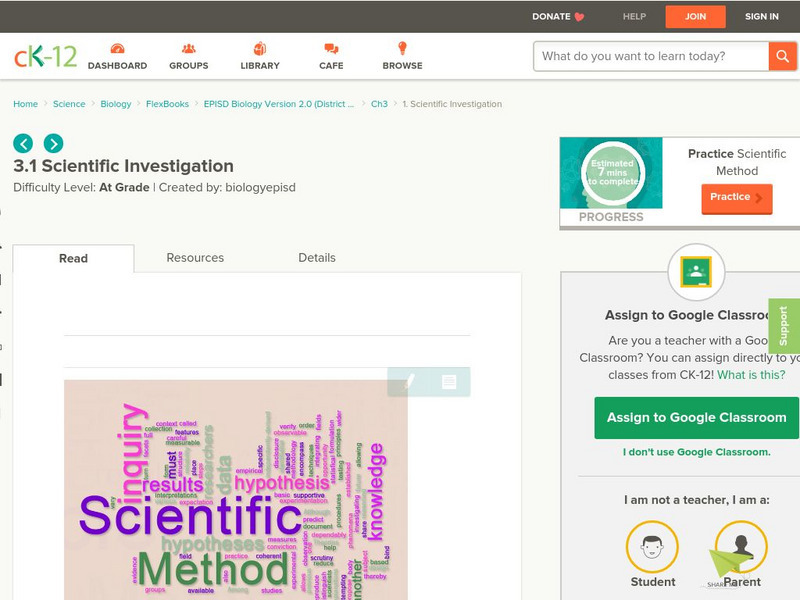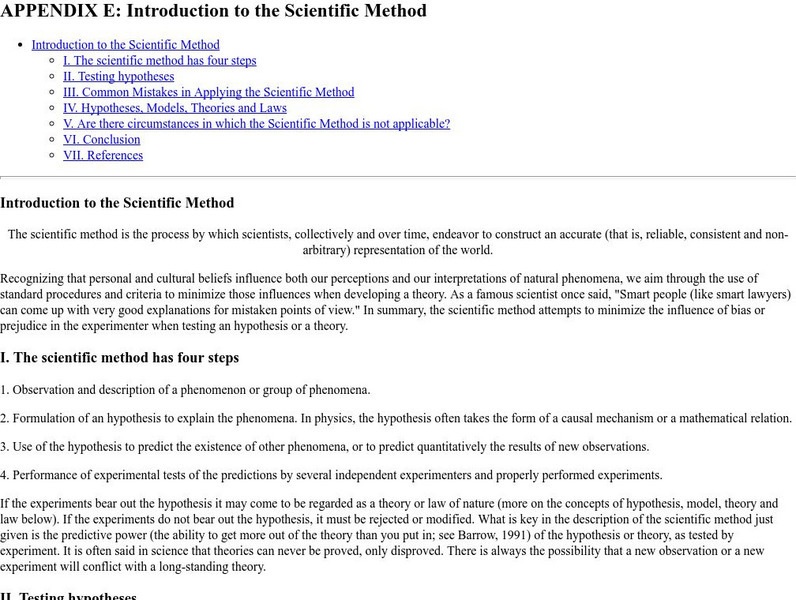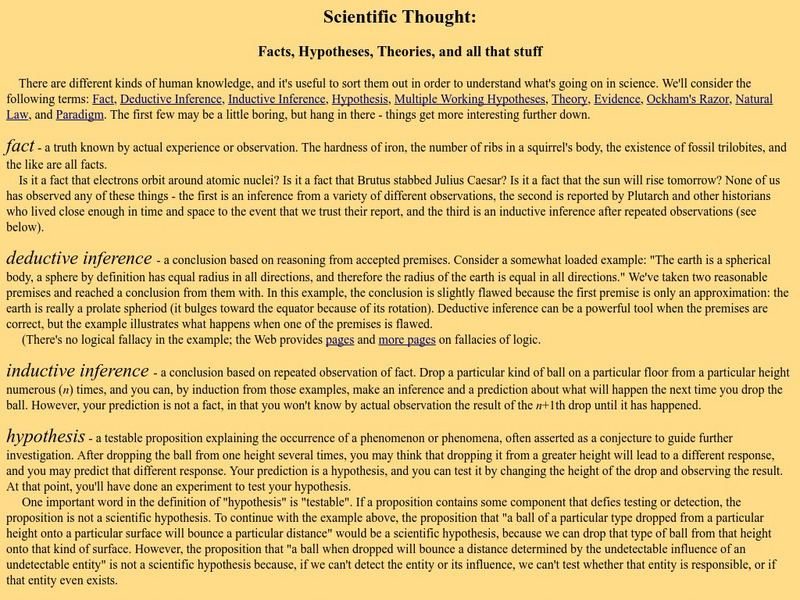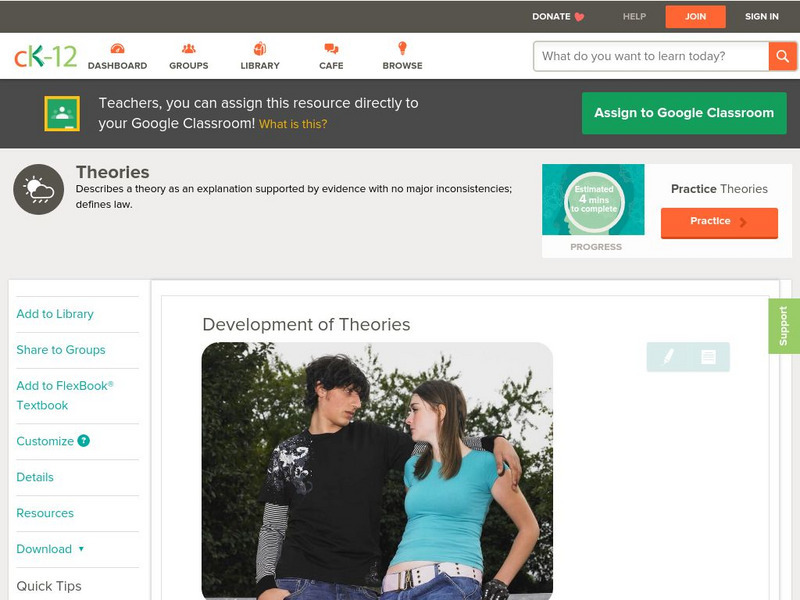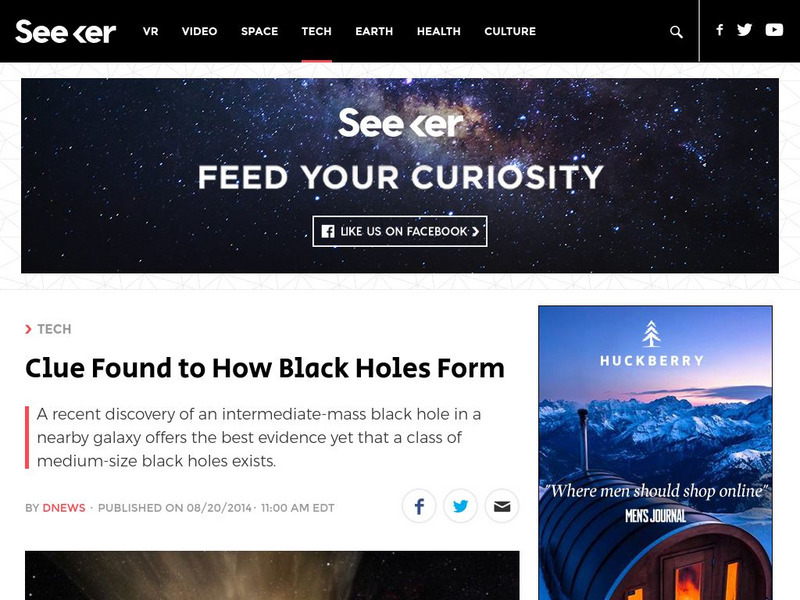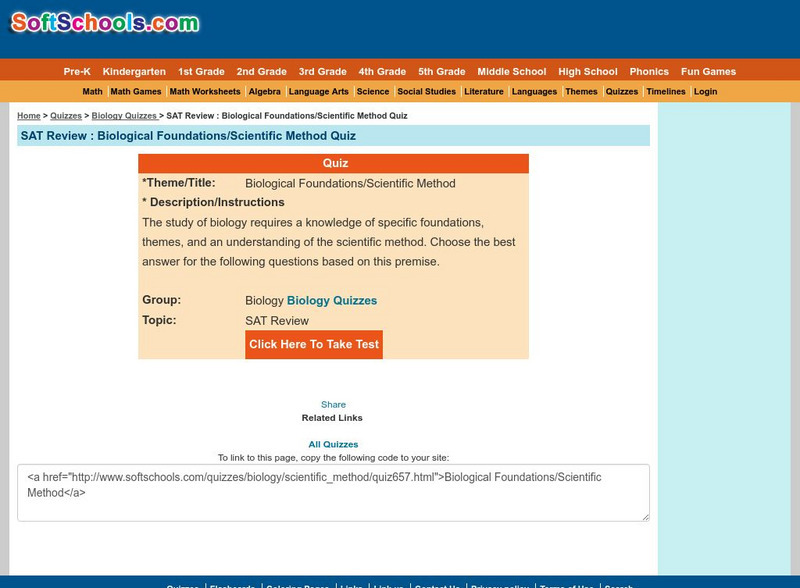CK-12 Foundation
Ck 12: Scientific Investigation
[Free Registration/Login may be required to access all resource tools.] This lesson looks at how the scientific method is applied in a scientific investigation, and at the differences between theories and hypotheses in science.
Utah Education Network
Uen: Timeline for the Atom
Young scholars will examine how significant scientific theories are developed, explore the work of scientists who contributed ideas to the atomic theory, and develop a timeline of key scientists to show how the work of each one built on...
PBS
Pbs Learning Media: That's My Theory!
Become a game show contestant in this online activity from A Science Odyssey and ask a series of questions to a panel of mystery scientists, using the answers to determine which scientist is Einstein.
Other
University of Rochester: Intro. To the Scientific Method
Here you can find a detailed overview of the scientific method. Content addresses what the scientific method is, its four steps, some common mistakes when applying the scientific method, and more.
University of Georgia
University of Georgia: Scientific Thought: Facts, Hypotheses, Theories, Etc.
Provides explanations of terms used in science: fact, deductive inference, inductive inference, hypothesis, multiple working hypotheses, theory, evidence, Ockham's Razor, natural law, and paradigm.
Scientific American
Scientific American: Happy 200th Birthday Charles Darwin: In Depth Reports
Explore the thinking of Charles Darwin, and read how his theory of evolution survives, thrives, and shapes the way we learn about nature. (February 2009)
Internet History Sourcebooks Project
Fordham University: Modern History Sourcebook: The Principles of Scientific Management
An essay by Frederick W. Taylor that outlined his theory of scientific business management, how it worked, and why it was important to industry in the beginning of the 20th century.
TED Talks
Ted: Ted Ed: What's the Difference Between a Scientific Law and Theory?
What is the difference between a theory and a law, and is one better? Matt Anticole shows why science needs both laws and theories to understand the whole picture. [5:12]
CK-12 Foundation
Ck 12: Chemistry: Scientific Problem Solving
[Free Registration/Login may be required to access all resource tools.] Introduces the scientific method and presents the difference between a theory and a law.
CK-12 Foundation
Ck 12: Earth Science: Development of Theories
[Free Registration/Login may be required to access all resource tools.] Examines theories and laws in science.
CK-12 Foundation
Ck 12: Earth Science: Development of Theories
[Free Registration/Login may be required to access all resource tools.] Examines theories and laws in science.
CK-12 Foundation
Ck 12: Earth Science: Development of Theories
[Free Registration/Login may be required to access all resource tools.] Examines theories and laws in science.
CK-12 Foundation
Ck 12: Earth Science: Development of Theories
[Free Registration/Login may be required to access all resource tools.] Examines theories and laws in science.
CK-12 Foundation
Ck 12: Chemistry: Scientific Problem Solving
[Free Registration/Login may be required to access all resource tools.] Describes scientific problem solving and the scientific method.
Stanford University
Stanford Encyclopedia of Philosophy: Scientific Discovery
Scientific discovery is the process or product of successful scientific inquiry. Objects of discovery can be things, events, processes, causes, and properties as well as theories and hypotheses and their features (their explanatory...
CK-12 Foundation
Ck 12: Earth Science: Development of Theories Study Guide
[Free Registration/Login may be required to access all resource tools.] This study guide briefly summarizes key points about the development of theories in science. Includes a few questions to check for understanding.
Story Behind the Science
Story Behind the Science: Detection of Black Holes [Pdf]
Article outlining the scientific history behind the discovery of black holes. The writer discusses how scientific theories guide scientists in creating explanations for natural phenomena.
Seeker
Seeker: Week of 8 25 14: How Do Black Holes Form? Clue Found
Learn what a black hole is and explore the latest scientific theories about how they form.
Story Behind the Science
Story Behind the Science: Just How Big Is the Universe? [Pdf]
Explains the history of the scientific debate and research on the topic of the size of the universe. The writer discusses the relevance of debate in the evolution of scientific theories.
PBS
Pbs Learning Media: How Big Is the Universe?
In this media-rich essay from the NOVA Web site, astronomer Brent Tully of the University of Hawaii walks you through the latest scientific theories about the size of the universe.
Other
College of the Holy Cross: The Logic of Scientific Reasoning [Pdf]
Explore the idea of the logic of scientific reasoning with this discussion of how science, thinking, and reasoning relate to one another.
Science Education Resource Center at Carleton College
Serc: Writing to Support the Theory of Plate Tectonics
This lesson helps students use images that depict earthquakes, seafloor ages, topography, and volcanoes, and then make a scientific argument supporting the Theory of Plate Tectonics.
Soft Schools
Soft Schools: Biological Foundations/scientific Method Quiz
Take this interactive, multiple-choice quiz over biology concepts and the scientific method, then review your score and any missed questions at the end.
CPALMS
Florida State University Cpalms: Florida Students: Scientific Laws
Scientific law is defined and contrasted to societal laws. Examples are given.


